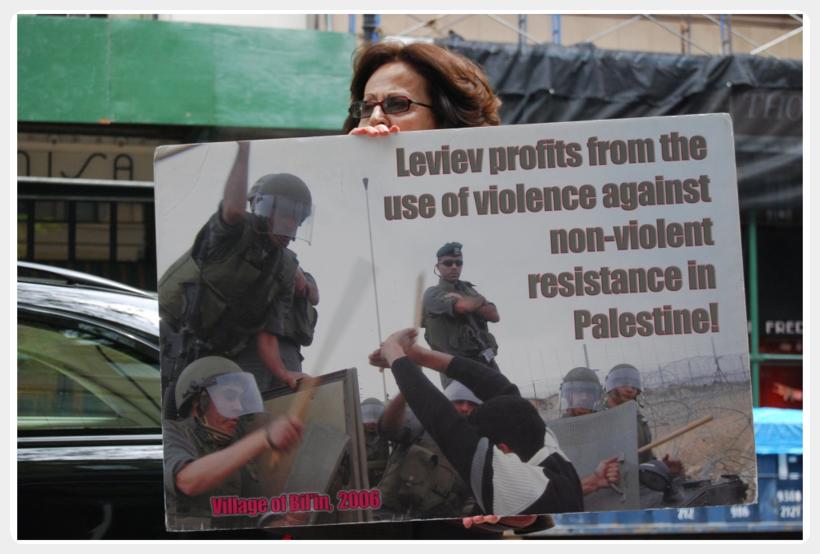Photo Gallery
Video
Mothers call for Mother’s Day boycott of Israeli settlement-builder Leviev
M’azuza Abu Rahmeh, a mother from Bil’in, explains, “I hope that on this important day for mothers that no women in the world will have to live through this type of experience and that instead they will live with their families and homes, in security and peace.” Halima Husain, a mother from Jayyous, adds, “I hope that free people around the world will boycott Israel’s occupation and will not support businesses of wealthy Israelis like Leviev who is building the settlement of Zufim, and that they will stand with us to lift this shadow and darkness that hangs over the Palestinian people.”
With our governments failing to act, the only way to end the suffering of Palestinian mothers and their families is to boycott Israeli companies like Leviev's that profit from the illegal activities of land confiscation and settlement construction. No diamond is worth the destruction of people's lives. This Mother’s Day support mothers like Halima Husain, and M’azuza Abu Rahmeh from Bil’in, along with their children. Boycott Leviev.
As mothers from New York City and from around the world, we stand with Palestinian mothers from villages like Jayyous and Bil’in and call on New Yorkers to boycott Lev Leviev’s Madison Avenue jewelry store every day, but especially on Mother’s Day. Leviev is exploiting this holiday in honor of mothers, the third biggest jewelry shopping period annually in the US, to sell his jewelry, even as his companies ruin the lives of mothers in Palestine.
Leviev’s companies have built homes for Israelis in the settlements of Zufim on the land of the West Bank village of Jayyous, Mattityahu East on Bil’in’s land, and homes in the Maale Adumim and Har Homa settlements, which are cutting off Palestinian East Jerusalem from the West Bank.
While all Israeli settlements violate international law and destroy hopes for peace, Leviev’s settlements also exact a heavy human toll on mothers and families. Halima Husain, a mother of seven from Jayyous, explains, “The settlement of Zufim was established directly on our land which was planted with olive, almond and fig trees. We registered complaints repeatedly with the Israelis with no results.” Now Israel has built its wall through Jayyous in order to annex 70% of the village’s farmland for Zufim’s expansion. Villagers need Israeli permits to pass through the wall and reach their farmland. Halima continues, “I don’t have a permit and my husband Hosni has been denied a permit for 10 months. One of my children has been held for 14 months in an Israeli prison and I haven’t been able to visit him for three months with the Israeli excuse of ‘security reasons.’ And now my husband’s income is insufficient to cover my son’s university education, the costs of my other son in prison and our household expenses, all because we can’t reach our land.”
Halima’s story is similar to many in Jayyous. The once-prosperous farming village of 3,400 residents is impoverished because families can’t access their land. 70% of Jayyous’ families are now in great need of food aid. 103 out of a total of 195 students in grades 7-12 have dropped out of school because parents can’t cover school expenses. In 2002, before Israel began the wall’s construction, 180 students from Jayyous were in universities. That number has now dropped to 50.
In Bil’in, M’azuza Abu Rahmeh, a mother of five boys and four girls, explains, “Our land was seized for the construction of Mattityahu East settlement. And our olive trees were cut down during the construction of the apartheid wall. These trees hold memories for each of my children that are impossible to forget. This pushed us to confront the bulldozers when they uprooted the trees during the wall’s construction.” M’azuza and her children, including her 23 year-old son Hamza, participated in Bil’in’s three-year nonviolent community campaign against the construction of the Mattityahu East and the apartheid wall which was intended to annex the settlement to Israel. M’azuza says that during the protests, “Hamza was gravely injured in the head when he was hit with a rubber-coated steel bullet, and he spent two weeks in the hospital. One month after he left the hospital the Israeli military came to our house at night and, after sowing fear in me and in my small children and turning our house upside down, they arrested Hamza. I felt as if my heart had been ripped from my body. I am pained when I remember our uprooted olive trees, and Hamza’s injury and arrest.”
During more than 200 demonstrations aiming to prevent the seizure of 50% of Bil’in’s land, the Israeli military has injured around 1,000 civilian protesters, including Israelis and internationals, and arrested 50. Around 300 of those injured and 13 of those jailed were children from Bil’in.

